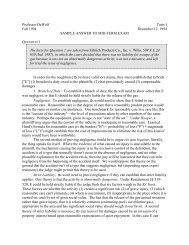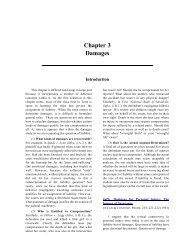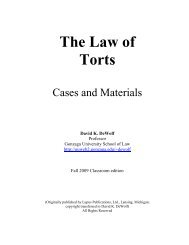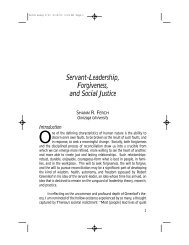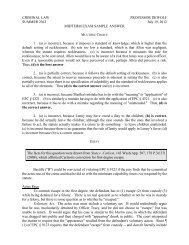were based upon Wawanesa Mutual Ins. Co. v. Matlock, , 60
were based upon Wawanesa Mutual Ins. Co. v. Matlock, , 60
were based upon Wawanesa Mutual Ins. Co. v. Matlock, , 60
Create successful ePaper yourself
Turn your PDF publications into a flip-book with our unique Google optimized e-Paper software.
DeWolf, Torts I, Fall 2002, Midterm Sample Answer Page 3<br />
III. Damages<br />
There are two different types of damages here, reflecting the different plaintiffs. The<br />
property damage claim made by Pacific Telephone would be measured by the diminution in the fair<br />
market value of the logs (or other property) before and after the fire.<br />
The claim for Perry's death would be more complex. The first question is who is eligible to<br />
collect the wrongful death damages. Under the statute, the benefits are limited to a spouse, parents,<br />
or children. There do not appear to be any. Sarah in particular does not qualify, although despite<br />
the statement that P was "single," and an engagement that reflects their own belief that they <strong>were</strong><br />
not married, perhaps they in fact met the standard for common law marriage. It's a very long shot,<br />
but I'd want to verify that S is not P's spouse.<br />
Moreover, the only damages permitted by the statute are pecuniary damages, which are<br />
usually interpreted to mean economic loss. Since there is (apparently) no one qualified to recover<br />
loss from Perry's death, again there would be no recovery. If Sarah <strong>were</strong> qualified as a common law<br />
spouse, she would be limited to lost wages, rather than any kind of pain and suffering or loss of<br />
consortium benefits.<br />
There is a provision in the statute for recovery of funeral and medical care expenses if no one<br />
is qualified to recover for the economic loss. If Perry had lingered, this could be a substantial sum,<br />
but since he died at the scene it looks like the only damages will be the cost of a funeral.<br />
It's conceivable that Sarah or some other person suffered a bystander injury from watching<br />
Perry die in the fire. Typically courts employ some version of the three-pronged test in Dillon v.<br />
Legg: (1) was the plaintiff at the accident scene; (2) did he or she suffer a direct emotional impact<br />
from observing the tragedy; and (3) <strong>were</strong> the plaintiff and the victim closely related? I doubt that<br />
any of the firefighters would qualify, and there's no suggestion that Sarah was at the scene of the<br />
accident. If she came shortly after the accident, before there had been a material change in the<br />
scene, she might have a claim, but that's speculative.<br />
QUESTION 2<br />
This case is loosely <strong>based</strong> on the facts in Fifer v. Dix, 2000 Wis.2d 66, <strong>60</strong>8 N.W.2d 740<br />
(2000), in which the court reversed a summary judgment in favor of the dog owner, holding that<br />
the plaintiff had a statutory claim for strict liability, but failed to establish any negligence.<br />
Fifer should consider tort claims against both Dix and Kappel. In order to prevail, Fifer<br />
would have to establish (1) a breach of duty that (2) proximately caused (3) his damages.<br />
I. Breach of Duty<br />
A breach of duty can be established in two ways: first, Fifer could establish that either Dix<br />
or Kappel was negligent in their handling of Zippy; or he could try to show that one or both is<br />
strictly liable for Zippy's behavior.<br />
Negligence. Both Dix and Kappel would be under an obligation to use reasonable care in<br />
their handling of Zippy. Fifer might allege that Dix and/or Kappel failed to use reasonable care, and<br />
therefore should be found negligent. I don't know how promising this argument would be. It seems<br />
likely that the jurors, many of whom own dogs, and perhaps hunt, would exercise their own<br />
judgment about this matter, and would likely see Dix and Kappel as behaving reasonably in simply<br />
warning about Zippy's dangerous tendencies. On the other hand, the jury might think that either



